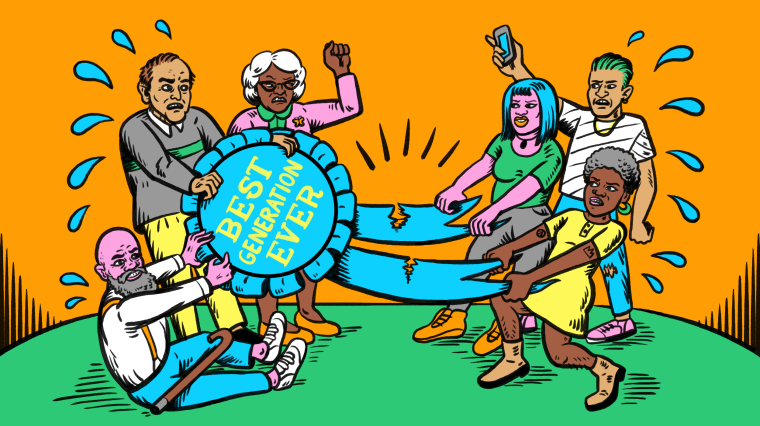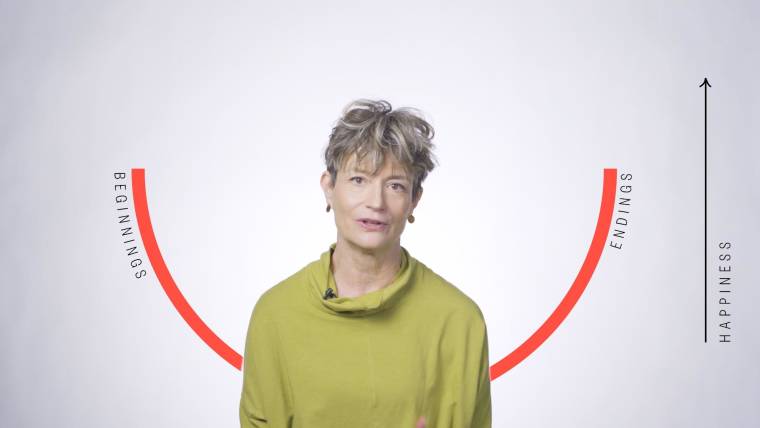29 Gen Z launched a preemptive strike against baby boomers earlier this fall using the most powerful weapons in their arsenal — social messaging platforms TikTok, Snapchat and Instagram — to create a simple, yet biting, retort to a generation they perceive as old-school and out of touch: “OK, Boomer.”
30 Don’t believe climate change is real? OK, Boomer. Want to call all young people “snowflakes” and blame them for every ill in the world? #OkBoomer. The phrase has now gone viral, appearing in memes and merchandise being snapped up by the Gen Z crowd.
31 With generations, the arrival of the newest cohort signals a threat; there are more people now competing for resources — whether it be jobs, attention or power.
32 Our youngest generation has had a front row seat to the headlines mocking their millennial predecessors, and in many ways, these two feisty words represent Gen Z pushing back on the attempts they expect will be made to label and belittle their own generation as they take the place of millennials at the bottom of the pecking order. But in the process of defending themselves, they are unfortunately perpetuating the very age-oriented stereotypes they themselves don’t want to be labeled by.
33 Generational difference is one of the final frontiers where identity-based stereotypes, prejudice and putdowns are allowed to not only run rampant but also to be expressed without shame. After all, no one has any control over what generation they are part of; it’s based solely on birth year. As a new generation comes of age, it’s an ideal time for all of us to become aware of the harm this does — and the potential to be found in generations respecting and learning from each other instead.
37 Generations are at their core a type of cultural diversity. We expect people who have grown up in different parts of the world to embrace different norms and exhibit different behaviors, but we’re frustrated when this same phenomenon occurs among people who have grown up in different points of history. Viewing generational differences as a kind of diversity can help us grasp why they are so complex and difficult to understand — and also can help us be more successful in how we approach them.
38 The idea of a generation is not without controversy, and much of what’s written about the generational divide is not grounded in scientific research. However, there are substantiated, and important, differences in our generational identity: Research has shown that those born within the same generation form “collective memories” based on the critical social and cultural events they experience together, and these can result in specific norms, attitudes and behaviors.
39 The Pew Research Center recognizes five generations in today’s workplace shaped by different social, historical and technological forces.
41 For instance, a boomer's worldview was shaped largely by the Vietnam War, while for Gen X it was the fall of the Iron Curtain and for millennials, it was the Sept. 11, 2001 terror attacks. And millennials are most comfortable texting, while many Gen Xers prefer email and boomers the telephone. It can be easy to use these differences as shorthand stereotypes (millennials, say, complaining about their parents being so rude and backward as to call). But when we do so, we are falling back on a shortcut in our decision making by assuming all people born during a certain time frame are universal in their beliefs and behaviors, and as a result we spend less time and effort trying to understand them.
42 That’s because we tend to favor those we perceive as most like us, and to label and distance ourselves from those not in this group. With generations, the arrival of the newest cohort signals a threat; there are more people now competing for resources — whether it be jobs, attention or power. The roots of this can be traced back as far as Homer, who wrote in the Iliad, “And so with men: As one generation comes to life, another dies away.”
43 Related
47 But when we use generations as a lens rather than a label, it can help us generate deeper understanding of one another instead of fear. Take the lens a boomer may use to view his or her career. In general, baby boomers were raised with a “children should be seen and not heard” mentality by parents who survived the Great Depression. Galvanized by their parents’ economic insecurity, they seized on their careers and popularized the 70-80 hour workweek. They kept their heads down, given the defense instilled in their upbringing, and paid their dues to climb their way up the ladder. Grateful to the companies that gave them opportunity and security, they showed strong loyalty.
48 In contrast, social media and fake news have shaped Gen Z’s views of information and communication, and traditional notions of career are crumbling away. Whereas age once equaled expertise, the rapid pace of change means Gen Z can be more knowledgeable about technology than people twice as old. Putting one’s head down and paying dues to someday earn the right to have a voice and power makes little sense to a generation that has grown up empowered by their parents and whose high school peers have created empires from their smartphones as YouTube stars and Instagram influencers.
49 Research on intergenerational interactions shows when those with different generational identities interact, two mindsets can occur: one that’s resistant or transmitive. Under the former, generations view each other as competitors, resulting in defensiveness and distrust since any gains in power and resources come at the expense of the others. We seem to be stuck in this resistant mindset due to two intersecting forces: the record number of generations competing for jobs given increasingly longer lifespans, and a rate of change that’s greater than we’ve ever seen.
50 When we use generations as a lens rather than a label, it can help us generate deeper understanding of one another instead of fear.
51 So if the digital savvy of millennials and Gen Z is valuable, it threatens the relevance of the experience of baby boomers; better to dismiss them as snowflakes. If boomers and Gen Xers offer guidance and feedback based on their accumulated wisdom, younger generations perceive that as undermining the validity of their viewpoint, so better to shrug it off with “OK, boomer.”
52 In contrast, a transmitive mindset focuses on shared goals and how resources can be combined (whether tangible or intangible) to create something mutually beneficial. This approach results in greater empathy, cooperation and trust.
53 If we can move past our defensive mindset, these same differences bring with them an incredible opportunity. We know organizations that lead their diverse talent well realize benefits not just in terms of their bottom lines, but also their abilities to innovate and collaborate.
54 Let’s stop the generation shaming, the name calling, the scapegoating. Let’s instead think about what different generations can both teach and learn from each other, and how those conversations can result in entirely new ways of solving problems. As author Ken Blanchard said, “None of us is as smart as all of us.” OK, Gen Z?
55 Related:








0 General Document comments
0 Sentence and Paragraph comments
0 Image and Video comments
General Document Comments 0

